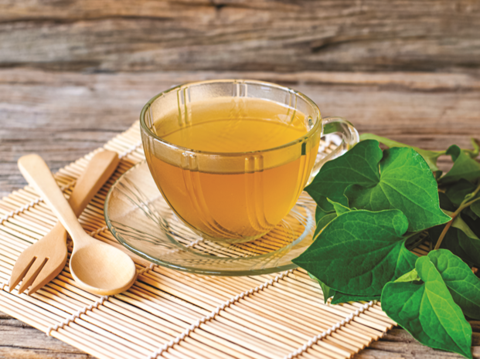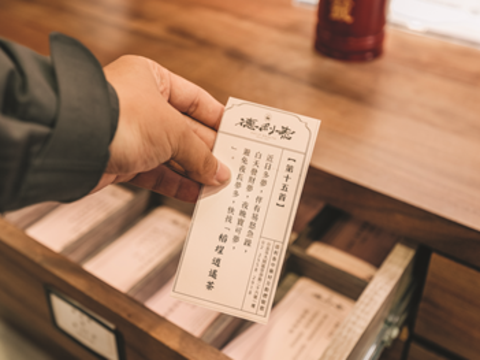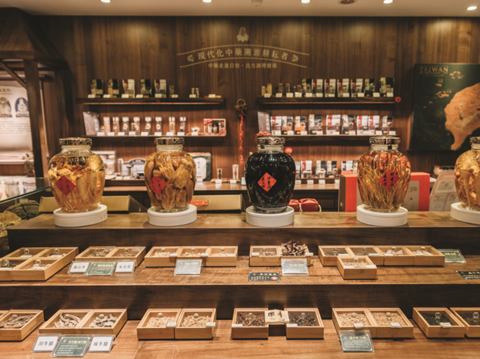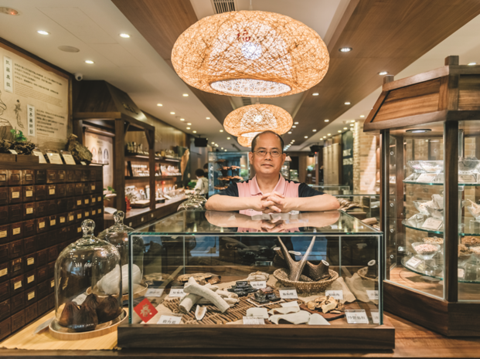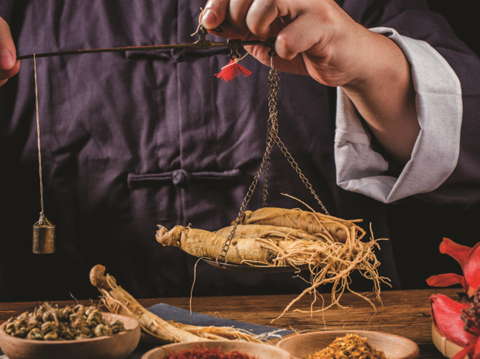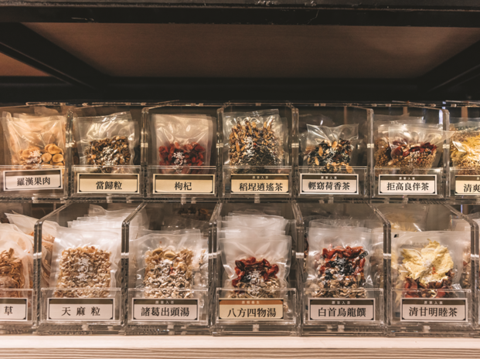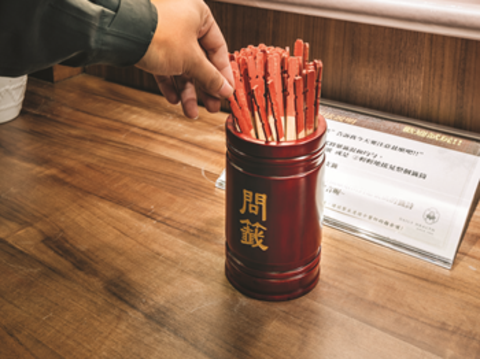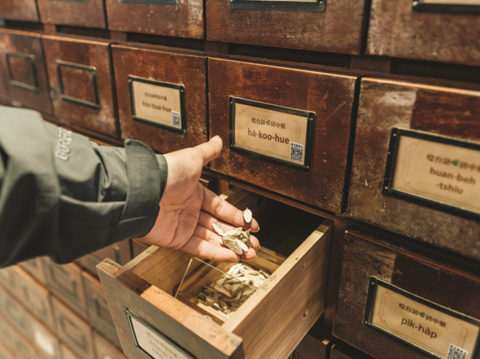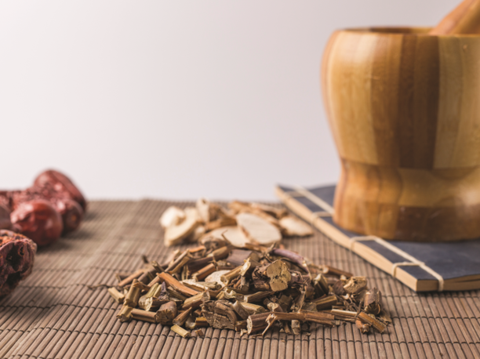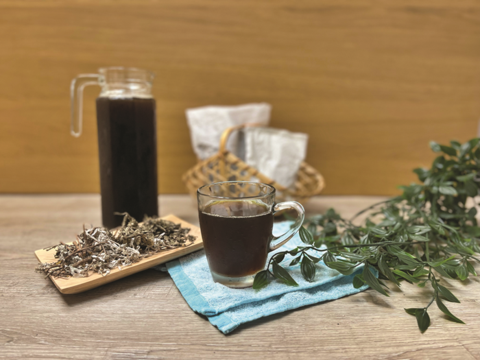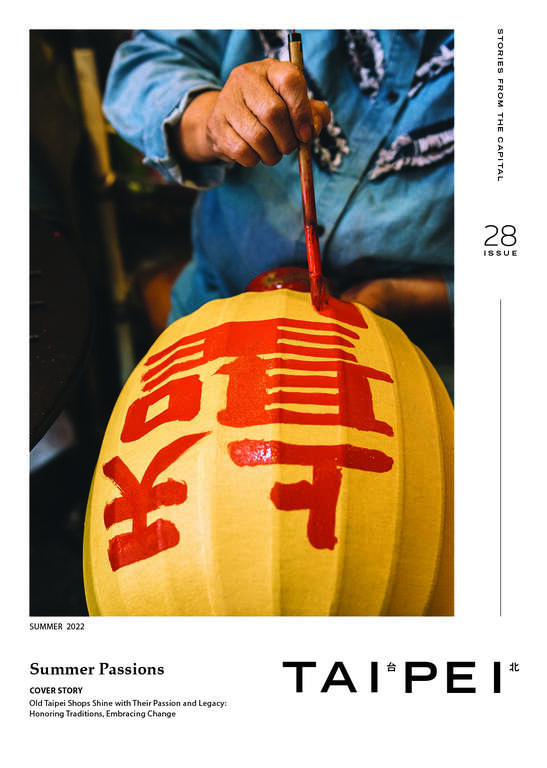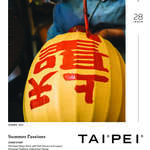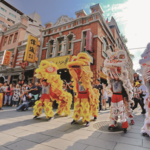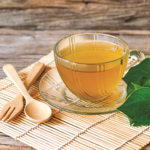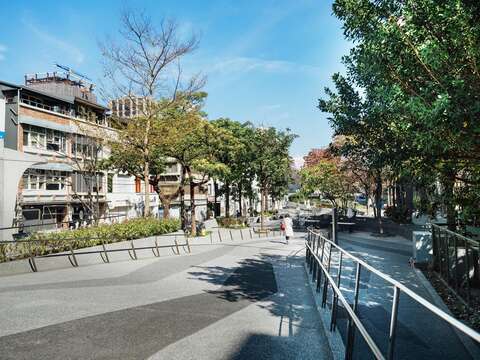Post date:2022-06-13
1094
TAIPEI #28 (2022 Summer)
Soothing the Summer Heat with Herbal Dietary Therapies
Author Elisa Cohen
Photographer Samil Kuo, Taiwan Scene, Plu Kaow, dashu83, fanjianhua
During the sweltering summer days in Taipei, the hot sun and stuffy air can make one feel restless. In addition to gorging on iced drinks and escaping to air-conditioned rooms to get out of the heat, you can also use herbal dietary therapies to get rid of the humidity and heat in your body, bringing about a sense of calming coolness from the inside out.
TAIPEI paid a visit to Daily Health (德利泰), a traditional Chinese medicine (TCM) experience center in historic Dadaocheng, where founder Ching-niu Chen (陳清鈕) introduced us to Chinese herbal ingredients and traditional medicinal materials that can be used to make tea or dishes to help alleviate heat and cool down in summer.
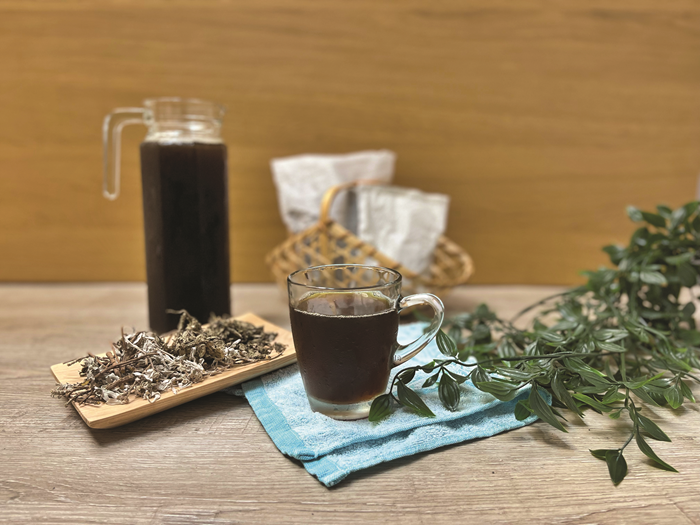 ▲Drinking herbal tea to alleviate heat from the inside out has long been a traditional way to stay cool in Taiwan’s hot summer climate. (Photo/Taiwan Scene)
▲Drinking herbal tea to alleviate heat from the inside out has long been a traditional way to stay cool in Taiwan’s hot summer climate. (Photo/Taiwan Scene)
Chen also provided tips on how one can choose herbal ingredients for daily health maintenance and care. He went on to share the various interactive courses offered in the experience center, so that more people can learn about TCM materials, their applications, as well as the heritage and culinary culture behind them.
Getting to Know TCM Materials in Daily Life
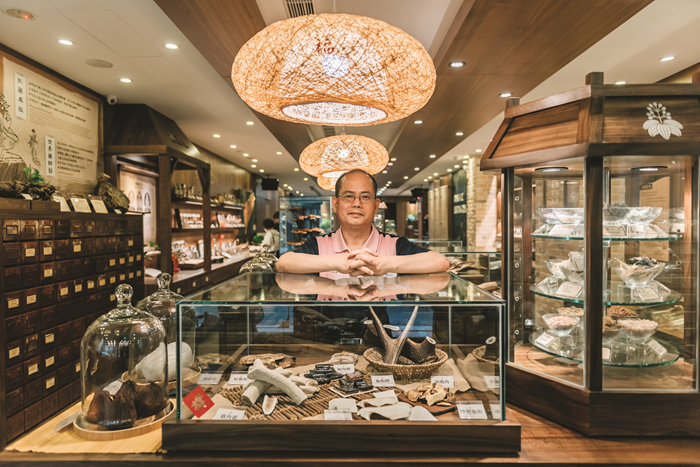 ▲Chen, the founder of Daily Health, shares with us how these medicinal materials can be applied on a daily basis.
▲Chen, the founder of Daily Health, shares with us how these medicinal materials can be applied on a daily basis.
TCM materials such as jujube, Chinese wolfberry, astragalus and lotus seeds are commonly found in TCM stores all over Taiwan. Most people on the island have an image of such shops as dark and outdated places, housed in old and gloomy rooms filled with a dizzying array of smells. However, Daily Health has turned this stereotype around. “We present the ingredients in an unconventional way, hoping to arouse people’s interest,” Chen says.
In Daily Health, you will not only find diverse medicinal materials displayed in a bright and open space, but also learn about TCM ingredients in a very different way. The shop has even set up a hydroponic wall garden where herbs can be picked directly.
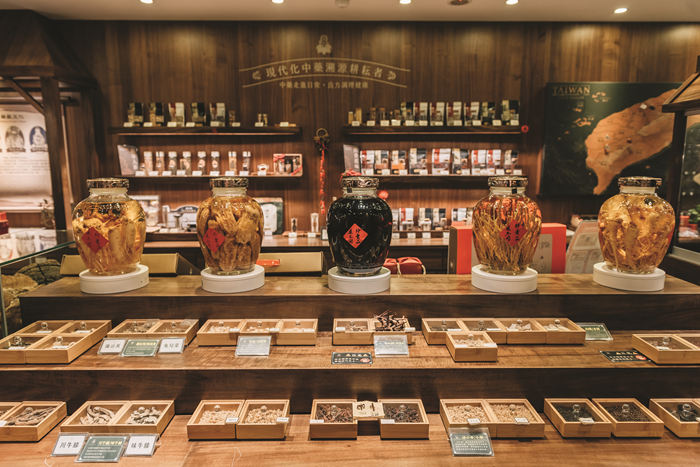 ▲In Daily Health, people can learn more about the origins and applications of diverse TCM materials.
▲In Daily Health, people can learn more about the origins and applications of diverse TCM materials.
Chen notes that TCM covers a wide range of materials. There are plant-based herbs, as well as materials extracted from animals, and even stones and amber, rare materials that can also be used in medicine. He also shares that many of the spices we are familiar with can also be used as medicine, including cinnamon, pepper, chili, star anise and nutmeg.
Chen points out, “Spices are also a part of traditional Chinese medicine, and many of them can promote metabolism or aid digestion.” In Taiwan, spices are often wrapped in cotton cloth and used in meat stews and soups. The boiling broth helps to release the aroma and effects of the spices. Meanwhile, in India, the same ingredients are often mashed and stir-fried to make different kinds of curries.
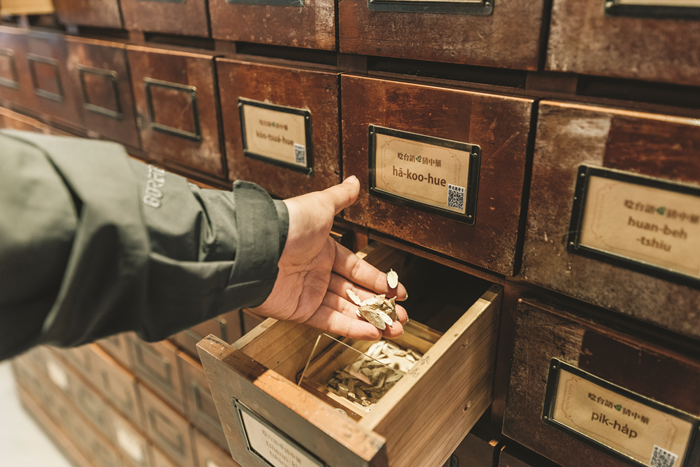 ▲Extracted from natural ingredients, TCM usually helps to alleviate discomfort.
▲Extracted from natural ingredients, TCM usually helps to alleviate discomfort.
In fact, Taiwanese home cooking has long incorporated ingredients with health benefits. For example, star anise is used in stews, and angelica can be cooked with soup to not only increase the flavor but also strengthen the body. Based on these practices, Daily Health hopes to remind people how often TCMs are integrated with our daily life, and encourage everyone to gradually become familiar with the application of herbs and spices.
Recipe for Heat Relief
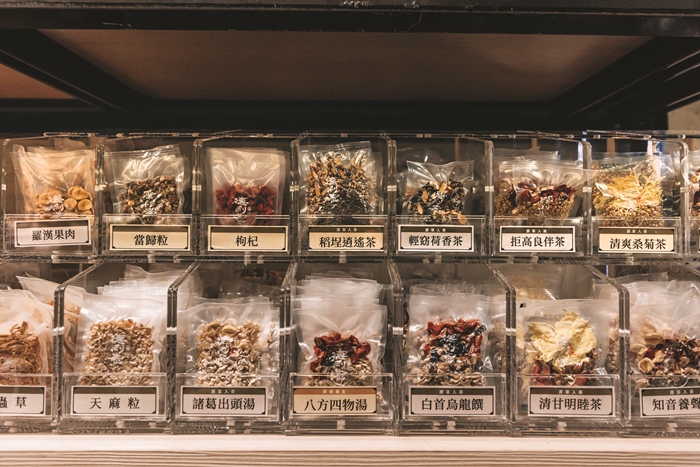 ▲Daily Health provides various blends of different herbal ingredients for tea, according to the needs of modern society.
▲Daily Health provides various blends of different herbal ingredients for tea, according to the needs of modern society.
“On hot days, everyone likes to drink cold drinks, but this tends to accumulate humidity in the body, so you can eat Sichuan peppers to remove the humidity and relieve the heat,” Chen notes.
Sichuan pepper (Zanthoxylum simulans), native to the mountains of southwest China, is the main star of Sichuan's renowned spicy cuisine, with a strong, pungent aroma and a refreshing coolness that leaves a tingling sensation in the mouth. Eating Sichuan peppers can help with perspiration, as well as expelling humidity and stuffiness from the body. Sprinkling some pepper powder when frying meat and stir-frying vegetables not only enhances the flavor, but also helps to expel sweat and cool the body.
Mulberry leaves are also a great summertime companion. After drying and kneading, they can be brewed into a tea with a refreshing aroma like matcha, which can relieve dryness and heat and reduce swelling caused by fluid buildup in the body’s tissues. In addition to mulberry tea, Chen also points out that the rest of the mulberry tree is a source of great nutritional value as well. The sweet and sour mulberry fruit is rich in fiber and iron, which can enrich the blood and help metabolism.
Furthermore, Chen also adds that fish mint (Houttuynia cordata) has anti-inflammatory effects, and can also reduce the body’s internal heat and relieve pain. It is most commonly taken as a tea. To increase the cooling effect, mint can also be added, which will help to relieve heat and refresh the mind. Aside from drinking, some people also use fish mint in soups, or even chop it up and fry it with eggs, as the unique herbal flavor can help remove greasiness.
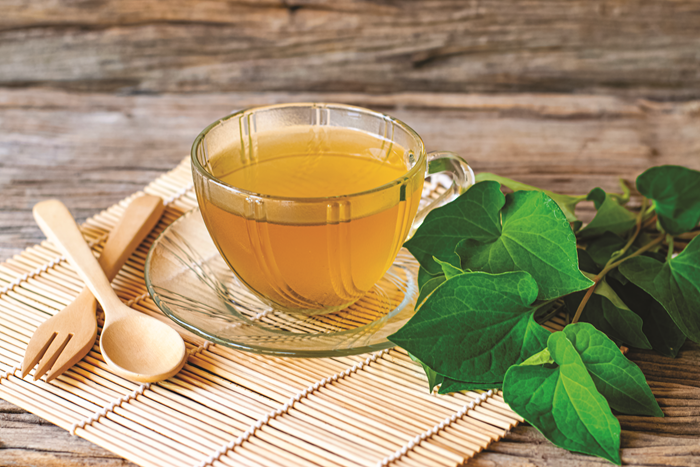 ▲Herbal tea brewed with fish mint and mulberry leaves helps to relieve heat in summer. (Photo/Plu Kaow)
▲Herbal tea brewed with fish mint and mulberry leaves helps to relieve heat in summer. (Photo/Plu Kaow)
Chen also shares his personal secret to health and wellbeing. “I recommend drinking less bubble tea and more herbal tea!” He reminds us that the next time we are thirsty, we should not forget that there are healthier options besides what is available at drink stands found throughout the streets of Taiwan.
Tips for Choosing Traditional Chinese Medicine
What are the details that people need to pay attention to when buying Chinese herbs? Chen points out several myths that have permeated the public’s perception when it comes to choosing products. “Many consumers go for aesthetics, thinking that the bigger the material the better, or the whiter the material the better, but that's not how TCM medicinal materials should be selected,” he says.
Chen goes on to explain that when it comes to many rhizome herbs such as Chinese angelica (Angelica sinensis), the shape of the native plant is actually very irregular. Especially large pieces may be re-manufactured through dehydration, whereby the significant nutrients will be lost in the process. In addition, natural herbs are almost impossible to be completely white; products that are unnaturally white and red are usually artificially bleached or dyed. For example, the color of natural Sichuan pepper should be dark brownish-red. If the color of the pepper is too bright, it may have been achieved through artificial dyeing.
To further promote the everyday use of herbs, Daily Health also has a section with a variety of herbs of similar appearance so that interested consumers can carefully compare and distinguish the differences. Chen shares his hope and vision that “People will become more familiar with Chinese herbal medicine and pass on the knowledge and traditions that have been passed down from our ancestors.”
Picking Up TCM Knowledge Through Interactive Experiences
Under the counseling of the Taipei City Office of Commerce (台北市商業處), Daily Health has developed a variety of interactive experiences to provide the public with the opportunity to understand Chinese herbal medicine and to give visitors from all over the world the chance to experience the local dietary therapy culture. Here, we’d like to introduce three activities that are fun and accessible for foreigners to grasp some basic understanding of TCM.
MEDICAL ORACLE CULTURE
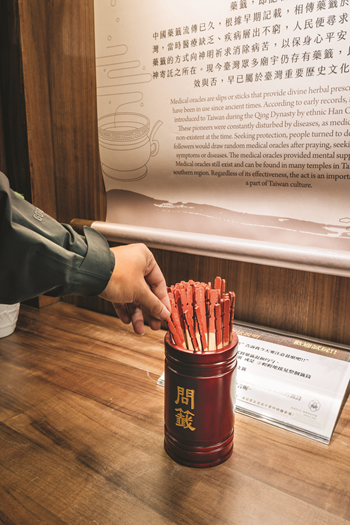
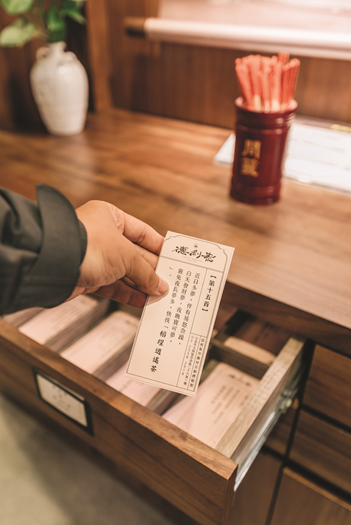
At Daily Health, there are bamboo fortune stick buckets which are usually found in temples in Taiwan, as well as poem slips with corresponding numbers which serve as a reference for people to find the right remedy for their particular ailment.
Chen explains that in ancient times, when medical resources were not well-developed, people would go to temples to pray to the gods, receive medicinal oracle slips, and ask the gods to prescribe remedies to relieve their discomfort. Most of the remedies on the oracle slips are for ailments that people were prone to catch at the time. For example, people in early agricultural societies would be afflicted by health problems associated with hard labor on the farm, and prescriptions on the oracle slips would be written accordingly. The oracle slips provided by Daily Health are designed to address the contemporary problems of people today, such as problems of modern sedentary lifestyles, staring at the computer and mobile phones for a long time, and irregular eating habits.
FILLING PRESCRIPTIONS
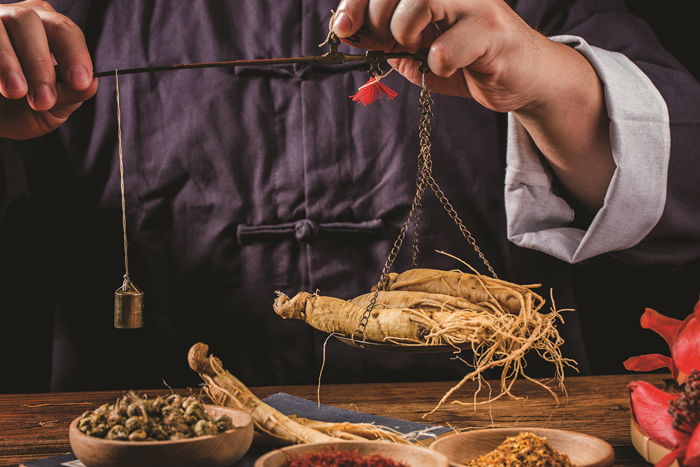
The traditional way of filling a prescription is to use a traditional medicine scale to measure the weight of different herbs, and then wrap the herbs in paper according to the proportion of the recipe. Daily Health retains the early tools so that visitors can experience the traditional way of prescribing and dispensing medicine. For this activity, reservations are strongly encouraged.
DIETARY THERAPY EXPERIENCE SEMINARS
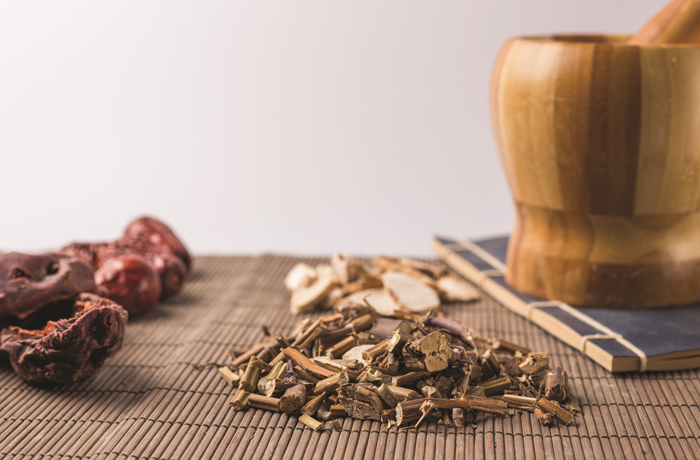
Daily Health invites TCM doctors to events to share their advice for daily health maintenance and how to use TCM materials to prepare corresponding healthy dishes and teas, so as to familiarize the public with the daily applications of traditional Chinese medicine. These activities are held irregularly. Please check Daily Health’s Facebook page for up-to-date information.
DAILY HEALTH
ADD 26, Gangu St., Datong Dist.
HOURS 10:00am - 6:00pm (Closed on Sundays)
Soothing the Summer Heat with Herbal Dietary Therapies
Author Elisa Cohen
Photographer Samil Kuo, Taiwan Scene, Plu Kaow, dashu83, fanjianhua
During the sweltering summer days in Taipei, the hot sun and stuffy air can make one feel restless. In addition to gorging on iced drinks and escaping to air-conditioned rooms to get out of the heat, you can also use herbal dietary therapies to get rid of the humidity and heat in your body, bringing about a sense of calming coolness from the inside out.
TAIPEI paid a visit to Daily Health (德利泰), a traditional Chinese medicine (TCM) experience center in historic Dadaocheng, where founder Ching-niu Chen (陳清鈕) introduced us to Chinese herbal ingredients and traditional medicinal materials that can be used to make tea or dishes to help alleviate heat and cool down in summer.
 ▲Drinking herbal tea to alleviate heat from the inside out has long been a traditional way to stay cool in Taiwan’s hot summer climate. (Photo/Taiwan Scene)
▲Drinking herbal tea to alleviate heat from the inside out has long been a traditional way to stay cool in Taiwan’s hot summer climate. (Photo/Taiwan Scene)Chen also provided tips on how one can choose herbal ingredients for daily health maintenance and care. He went on to share the various interactive courses offered in the experience center, so that more people can learn about TCM materials, their applications, as well as the heritage and culinary culture behind them.
Getting to Know TCM Materials in Daily Life
 ▲Chen, the founder of Daily Health, shares with us how these medicinal materials can be applied on a daily basis.
▲Chen, the founder of Daily Health, shares with us how these medicinal materials can be applied on a daily basis.TCM materials such as jujube, Chinese wolfberry, astragalus and lotus seeds are commonly found in TCM stores all over Taiwan. Most people on the island have an image of such shops as dark and outdated places, housed in old and gloomy rooms filled with a dizzying array of smells. However, Daily Health has turned this stereotype around. “We present the ingredients in an unconventional way, hoping to arouse people’s interest,” Chen says.
In Daily Health, you will not only find diverse medicinal materials displayed in a bright and open space, but also learn about TCM ingredients in a very different way. The shop has even set up a hydroponic wall garden where herbs can be picked directly.
 ▲In Daily Health, people can learn more about the origins and applications of diverse TCM materials.
▲In Daily Health, people can learn more about the origins and applications of diverse TCM materials.Chen notes that TCM covers a wide range of materials. There are plant-based herbs, as well as materials extracted from animals, and even stones and amber, rare materials that can also be used in medicine. He also shares that many of the spices we are familiar with can also be used as medicine, including cinnamon, pepper, chili, star anise and nutmeg.
Chen points out, “Spices are also a part of traditional Chinese medicine, and many of them can promote metabolism or aid digestion.” In Taiwan, spices are often wrapped in cotton cloth and used in meat stews and soups. The boiling broth helps to release the aroma and effects of the spices. Meanwhile, in India, the same ingredients are often mashed and stir-fried to make different kinds of curries.
 ▲Extracted from natural ingredients, TCM usually helps to alleviate discomfort.
▲Extracted from natural ingredients, TCM usually helps to alleviate discomfort.In fact, Taiwanese home cooking has long incorporated ingredients with health benefits. For example, star anise is used in stews, and angelica can be cooked with soup to not only increase the flavor but also strengthen the body. Based on these practices, Daily Health hopes to remind people how often TCMs are integrated with our daily life, and encourage everyone to gradually become familiar with the application of herbs and spices.
Recipe for Heat Relief
 ▲Daily Health provides various blends of different herbal ingredients for tea, according to the needs of modern society.
▲Daily Health provides various blends of different herbal ingredients for tea, according to the needs of modern society.“On hot days, everyone likes to drink cold drinks, but this tends to accumulate humidity in the body, so you can eat Sichuan peppers to remove the humidity and relieve the heat,” Chen notes.
Sichuan pepper (Zanthoxylum simulans), native to the mountains of southwest China, is the main star of Sichuan's renowned spicy cuisine, with a strong, pungent aroma and a refreshing coolness that leaves a tingling sensation in the mouth. Eating Sichuan peppers can help with perspiration, as well as expelling humidity and stuffiness from the body. Sprinkling some pepper powder when frying meat and stir-frying vegetables not only enhances the flavor, but also helps to expel sweat and cool the body.
Mulberry leaves are also a great summertime companion. After drying and kneading, they can be brewed into a tea with a refreshing aroma like matcha, which can relieve dryness and heat and reduce swelling caused by fluid buildup in the body’s tissues. In addition to mulberry tea, Chen also points out that the rest of the mulberry tree is a source of great nutritional value as well. The sweet and sour mulberry fruit is rich in fiber and iron, which can enrich the blood and help metabolism.
Furthermore, Chen also adds that fish mint (Houttuynia cordata) has anti-inflammatory effects, and can also reduce the body’s internal heat and relieve pain. It is most commonly taken as a tea. To increase the cooling effect, mint can also be added, which will help to relieve heat and refresh the mind. Aside from drinking, some people also use fish mint in soups, or even chop it up and fry it with eggs, as the unique herbal flavor can help remove greasiness.
 ▲Herbal tea brewed with fish mint and mulberry leaves helps to relieve heat in summer. (Photo/Plu Kaow)
▲Herbal tea brewed with fish mint and mulberry leaves helps to relieve heat in summer. (Photo/Plu Kaow)Chen also shares his personal secret to health and wellbeing. “I recommend drinking less bubble tea and more herbal tea!” He reminds us that the next time we are thirsty, we should not forget that there are healthier options besides what is available at drink stands found throughout the streets of Taiwan.
Tips for Choosing Traditional Chinese Medicine
What are the details that people need to pay attention to when buying Chinese herbs? Chen points out several myths that have permeated the public’s perception when it comes to choosing products. “Many consumers go for aesthetics, thinking that the bigger the material the better, or the whiter the material the better, but that's not how TCM medicinal materials should be selected,” he says.
Chen goes on to explain that when it comes to many rhizome herbs such as Chinese angelica (Angelica sinensis), the shape of the native plant is actually very irregular. Especially large pieces may be re-manufactured through dehydration, whereby the significant nutrients will be lost in the process. In addition, natural herbs are almost impossible to be completely white; products that are unnaturally white and red are usually artificially bleached or dyed. For example, the color of natural Sichuan pepper should be dark brownish-red. If the color of the pepper is too bright, it may have been achieved through artificial dyeing.
To further promote the everyday use of herbs, Daily Health also has a section with a variety of herbs of similar appearance so that interested consumers can carefully compare and distinguish the differences. Chen shares his hope and vision that “People will become more familiar with Chinese herbal medicine and pass on the knowledge and traditions that have been passed down from our ancestors.”
Picking Up TCM Knowledge Through Interactive Experiences
Under the counseling of the Taipei City Office of Commerce (台北市商業處), Daily Health has developed a variety of interactive experiences to provide the public with the opportunity to understand Chinese herbal medicine and to give visitors from all over the world the chance to experience the local dietary therapy culture. Here, we’d like to introduce three activities that are fun and accessible for foreigners to grasp some basic understanding of TCM.
MEDICAL ORACLE CULTURE


At Daily Health, there are bamboo fortune stick buckets which are usually found in temples in Taiwan, as well as poem slips with corresponding numbers which serve as a reference for people to find the right remedy for their particular ailment.
Chen explains that in ancient times, when medical resources were not well-developed, people would go to temples to pray to the gods, receive medicinal oracle slips, and ask the gods to prescribe remedies to relieve their discomfort. Most of the remedies on the oracle slips are for ailments that people were prone to catch at the time. For example, people in early agricultural societies would be afflicted by health problems associated with hard labor on the farm, and prescriptions on the oracle slips would be written accordingly. The oracle slips provided by Daily Health are designed to address the contemporary problems of people today, such as problems of modern sedentary lifestyles, staring at the computer and mobile phones for a long time, and irregular eating habits.
FILLING PRESCRIPTIONS

The traditional way of filling a prescription is to use a traditional medicine scale to measure the weight of different herbs, and then wrap the herbs in paper according to the proportion of the recipe. Daily Health retains the early tools so that visitors can experience the traditional way of prescribing and dispensing medicine. For this activity, reservations are strongly encouraged.
DIETARY THERAPY EXPERIENCE SEMINARS

Daily Health invites TCM doctors to events to share their advice for daily health maintenance and how to use TCM materials to prepare corresponding healthy dishes and teas, so as to familiarize the public with the daily applications of traditional Chinese medicine. These activities are held irregularly. Please check Daily Health’s Facebook page for up-to-date information.
DAILY HEALTH
ADD 26, Gangu St., Datong Dist.
HOURS 10:00am - 6:00pm (Closed on Sundays)
Gallery
:::
Popular articles
 TAIPEI Quarterly 2022 Summer Vol.28
TAIPEI Quarterly 2022 Summer Vol.28 Summer Roaming with the Taipei City God (TAIPEI Quarterly 2022 Summer Vol.28)
Summer Roaming with the Taipei City God (TAIPEI Quarterly 2022 Summer Vol.28) Meet LeHo, The Young Painter Putting Taipei Under the Kaleidoscope (TAIPEI Quarterly 2022 Summer Vol.28)
Meet LeHo, The Young Painter Putting Taipei Under the Kaleidoscope (TAIPEI Quarterly 2022 Summer Vol.28) Making Taipei a Foreigner-Friendly City: Improving Multilingual Services (TAIPEI Quarterly 2022 Summer Vol.28)
Making Taipei a Foreigner-Friendly City: Improving Multilingual Services (TAIPEI Quarterly 2022 Summer Vol.28) Hot and Spicy Food on Hot and Spicy Days (TAIPEI Quarterly 2022 Summer Vol.28)
Hot and Spicy Food on Hot and Spicy Days (TAIPEI Quarterly 2022 Summer Vol.28) Soothing the Summer Heat with Herbal Dietary Therapies (TAIPEI Quarterly 2022 Summer Vol.28)
Soothing the Summer Heat with Herbal Dietary Therapies (TAIPEI Quarterly 2022 Summer Vol.28)
 Soothing the Summer Heat with Herbal Dietary Therapies (TAIPEI Quarterly 2022 Summer Vol.28)
Soothing the Summer Heat with Herbal Dietary Therapies (TAIPEI Quarterly 2022 Summer Vol.28)